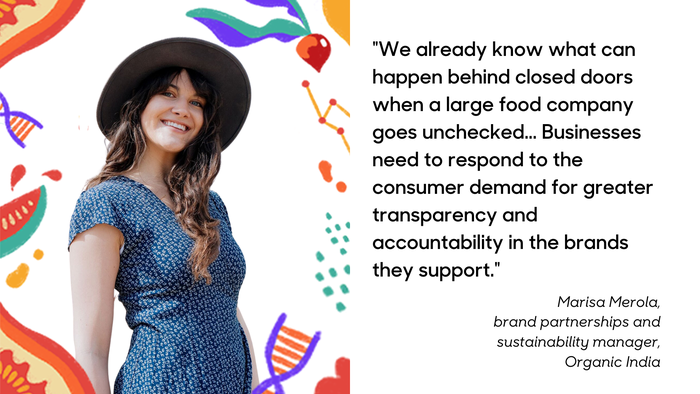The Future of Food: Creating a holistic food systemThe Future of Food: Creating a holistic food system
Food companies should consider following three paths to ignite innovation and integrity across their brands and the industry. Find out more.
November 16, 2023

New Hope Network encourages its community members to share open and transparent dialogue about issues that are impacting the food industry and its future. Please help us keep this conversation going. If you’re interested in sharing your opinions on the future of food, email Jessica Rubino at [email protected]. All opinions are welcome.
Humans have fallen into what is known as “food disconnect.” The general population is increasingly unaware of where their food is grown, who is growing it and how it’s being grown. Consumer trust is at an all-time-low, with less than 25% of American adults trusting companies, and even less for Gen Z with only 17% trust rate. The demand for greater transparency is the No. 1 trend in the food sector, with 6-in-10 consumers wanting to know the origins of their food.
Why? There are many reasons, but here are three primary ones:
How is it grown? When a company says organic, consumers want to know exactly what they are doing to ensure purity and quality.
How are the farmers and workers treated? There are far too many accounts of unethical treatment of workers within the food industry, and people are demanding fair wages and safe conditions.
What is the community impact? What are companies doing to support communities and reduce their carbon footprint?
The way companies answer these questions lies within the very framework of their business. Transparency shouldn't be piecemeal, it should be holistic and systematic, built into the company foundation and ethos. In other words, you can’t be partially transparent, there needs to be a full, unbroken narrative that brings food from the farm to the plate (or teacup, as the case may be).
We already know what can happen behind closed doors when a large food company goes unchecked: deforestation, wildlife destruction, animal mistreatment, soil degradation, water depletion and air pollution, to say the least. Businesses need to respond to the consumer demand for greater transparency and accountability in the brands they support.
Three paths brands should consider to inspire innovation and integrity
Direct trade
Direct trade is the act of businesses buying goods directly from growers and producers, with no intermediaries. This means there is only one degree of separation between the consumer and the farmer, making it far more profitable for farmers than conventional trade. In conventional agriculture, farmers sell to processors, who sell to distributors, who sell to wholesalers, who sell to companies, who sell to retailers, who, finally, sell to the consumer. This creates a disjointed supply chain that eats away at farmers’ profits and companies’ ethics.
But it doesn’t have to be this way. There are brands leading the way, where transparency is a living, breathing value. In the direct model, companies partner with organic farmers on small family farms and have an open feedback loop of support. Such companies are able to directly hear and respond to farmer requests, and offer organic supplies, training, certifications or anything else that may arise. These companies are also positioned to pay farmers fair wages and premium market prices upfront for their herbs, which goes directly into farmer bank accounts and community funds.
Direct and vertically integrated means procurement centers within the farming villages. This makes it easy and convenient for farmers to sell their herbs, versus the time, expense and inconvenience of traveling hundreds of miles to sell their crops. Beyond the farm, vertically integrated companies are more likely to own their manufacturing facility to ensure that products are processed in an environmentally and socially responsible way.
Direct trade supports complementary, rather than conflicting, business goals. Instead of a disjointed, horizontal supply chain of exploitation that benefits one entity and harms most everyone else; it’s a direct, vertical supply chain of union and friendship that honors every single person and resource involved in the production.
Regenerative organic agriculture
There is no trade if there are no crops. As we’ve painfully learned from industrial agriculture, when large-scale chemical, monoculture farming sweeps through, it may allow for short-term profit, but it ultimately kills the crops, the land and, very tragically, in some cases even the farmers. It’s a very dismal system, and not one that a company would be proud of or readily transparent about. However, by reclaiming traditional and regenerative farming methods, agriculture experts and organic farmers are able to work together to transform barren land back into the beautiful, lush, profitable farms they once were.
By working with nature, rather than against it, companies can make sure crops are suited to the area’s geography, geology and climate. They are able to treat every farm as a unique organism and cultivate each crop according to its specific needs. Further, when farming clusters are localized and regenerative, all inputs are made on the farm: seeds are made on the farm through organic seed saving and heirloom practices, compost is made on the farm with animals integrated and insects incorporated for soil health, and training is done on the farm with local experts to share knowledge and findings. This minimizes outside costs and creates thriving and self-sustaining ecosystems, while increasing crop yield, quality and profit for all stakeholders several times over.

Community empowerment
With direct trade and regenerative farming methods holding space for business to be conducted, there’s another piece of the puzzle to address: the community at large. What does a company do to support the local and global community? Is it going the extra mile to enrich not just farms but entire villages? To manufacture in a way that reduces waste? To package in a way that protects the oceans?
Ways that companies can support on the local level, for example, is to install water pumps for clean drinking water in villages, distribute manure and plant trees for ecosystem enrichment, provide healthcare for farmers and their families, aid local sanitation efforts and provide additional resources as needed. At the global level, a company can do its part by ensuring use of renewable energy to reduce carbon footprint, conserve water with efficient practices like rainwater collection, and divert waste from landfills and plastic from oceans with compostable and recyclable materials.
Because consumers are demanding more from the brands they support, organizations such as Fairtrade America and B Corporation look at the whole scope of a company’s impact and hold them accountable. B Corp recognizes companies for meeting the highest standards of verified social and environmental performance and transparency. It rigorously examines companies from the governance, community, worker, earth and customer level. Fairtrade America sets strict standards for companies' economic, social and environmental impact as it relates to fair wages, gender equality, workers’ rights and more. When businesses work in harmony with the land, farmers and community they help to create abundance for everyone. Younger men and women who long left the farming villages to go to the big cities are returning as they finally see a promising and fruitful future in the gardens of their grandparents. Businesses can literally be a manifestation of the very best version of this world. A world full of integrity, completely transparent, and inspiring innovation at every point in the business model.
About the Author
You May Also Like



.jpg?width=700&auto=webp&quality=80&disable=upscale)

.png?width=700&auto=webp&quality=80&disable=upscale)